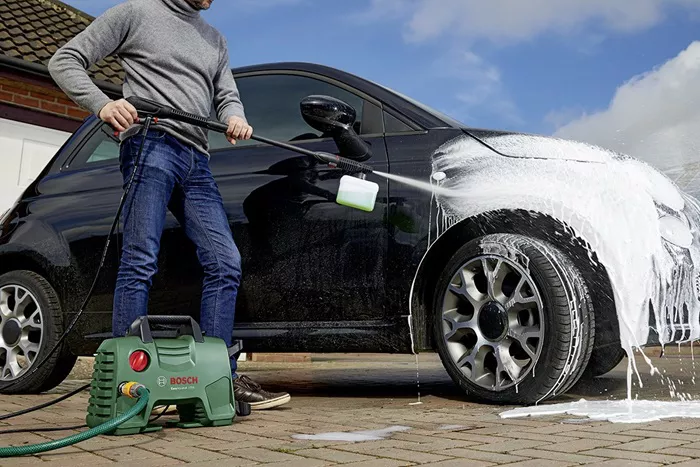Portable pressure washers are small and easy-to-carry cleaning machines. They use high-pressure water to remove dirt, dust, and stains from different surfaces. These machines are perfect for homes, gardens, cars, and even small businesses.
In the world of cleaning machines, portable pressure washers have gained huge popularity. They are lighter and easier to store compared to traditional large pressure washers.
How Does a Portable Pressure Washer Work?
Portable pressure washers work by using a motor or engine to pump water at high speed. This creates a strong stream that can clean surfaces very effectively. Some models use batteries, while others are electric or gas-powered.
The water comes out through a nozzle. You can often adjust the nozzle to change the pressure and pattern of the water spray.
Main Parts of a Portable Pressure Washer
1. Motor or Engine
This is the heart of the pressure washer. It powers the pump to move the water at high pressure.
2. Water Pump
The pump moves the water from the source through the washer and out of the nozzle.
3. Hose and Nozzle
The hose carries the high-pressure water to the nozzle. The nozzle controls the shape and pressure of the spray.
4. Detergent Tank (Optional)
Some models have a small tank to hold soap or cleaning solution. This helps clean greasy or very dirty surfaces better.
Types of Portable Pressure Washers
There are different Pressure Washer Types available. Choosing the right type depends on what you need to clean.
1. Electric Portable Pressure Washers
These use electricity to power the motor. They are quiet, lightweight, and easy to maintain. They are perfect for light cleaning jobs around the house.
2. Battery-Powered Portable Pressure Washers
These washers are powered by rechargeable batteries. They are great for cleaning places where there is no power outlet nearby. They are very convenient but may not be as powerful as gas or electric models.
3. Gas-Powered Portable Pressure Washers
These use gasoline engines. They are more powerful and suitable for heavy-duty cleaning. However, they are heavier and require more maintenance.
Common Uses of Portable Pressure Washers
Portable pressure washers have many Pressure Washer Uses. They are flexible and can clean a variety of surfaces.
1. Car Cleaning
You can use a portable pressure washer to wash cars quickly and efficiently. It removes mud, salt, and dirt easily.
2. Patio and Deck Cleaning
These washers are excellent for cleaning patios, decks, and outdoor furniture. High-pressure water removes algae, moss, and dirt.
3. Garden Equipment
Pressure washers can clean gardening tools, lawnmowers, and other outdoor equipment.
4. Home Exteriors
They can clean house walls, windows, driveways, and sidewalks. It keeps the home looking fresh and neat.
5. Small Business Cleaning
Some small business owners use portable pressure washers to clean shop fronts and machinery.
Benefits of Using a Portable Pressure Washer
1. Lightweight and Easy to Carry
One of the biggest advantages is the lightweight design. You can easily move the washer from one place to another.
2. Easy Storage
Portable pressure washers are small. They do not take much space in garages or storage rooms.
3. Versatility
You can use them for many tasks, from car washing to patio cleaning.
4. Affordable
Many portable models are cheaper than large professional machines.
5. Water-Saving
Pressure washers use less water compared to a regular garden hose while cleaning better and faster.
Limitations of Portable Pressure Washers
While they are very useful, there are also some Pressure Washer Cons you should know.
1. Lower Power
Portable models are usually not as powerful as heavy-duty pressure washers.
2. Battery Life Issues
Battery-powered models may run out of power quickly if used for long cleaning tasks.
3. Smaller Water Capacity
They may need more frequent water refills if they have a built-in tank instead of connecting directly to a water supply.
Tips for Choosing the Best Portable Pressure Washer
1. Check Water Pressure and Flow Rate
Look for models with good pressure (measured in PSI) and a decent water flow (measured in GPM).
2. Consider the Power Source
Choose between electric, gas, or battery depending on where and how you plan to use it.
3. Size and Weight
If you need to move the washer often, pick a lightweight and compact model.
4. Accessories and Nozzles
Extra nozzles and attachments can make cleaning easier and faster.
5. Warranty and Customer Support
Always check if the machine has a warranty and good customer support from the manufacturer.
Maintenance Tips for Portable Pressure Washers
1. Regular Cleaning
After use, clean the nozzle and hose to prevent blockages.
2. Proper Storage
Store the washer in a dry place. Protect it from freezing temperatures during winter.
3. Battery Care
If you have a battery model, make sure to charge it correctly and avoid deep discharges.
4. Inspect Before Use
Always check hoses, nozzles, and fittings before using the machine to avoid accidents.
Conclusion
Portable pressure washers are powerful and flexible tools for many cleaning jobs. They are a smart choice for homeowners, car owners, and even small businesses. Whether you are cleaning your car, home exterior, or garden tools, these washers save time and effort.
Understanding the different Pressure Washer Types and their Pressure Washer Pros and Pressure Washer Cons helps you make the best choice. If you want a machine that is lightweight, easy to store, and powerful enough for daily cleaning, a portable pressure washer is a great investment.

